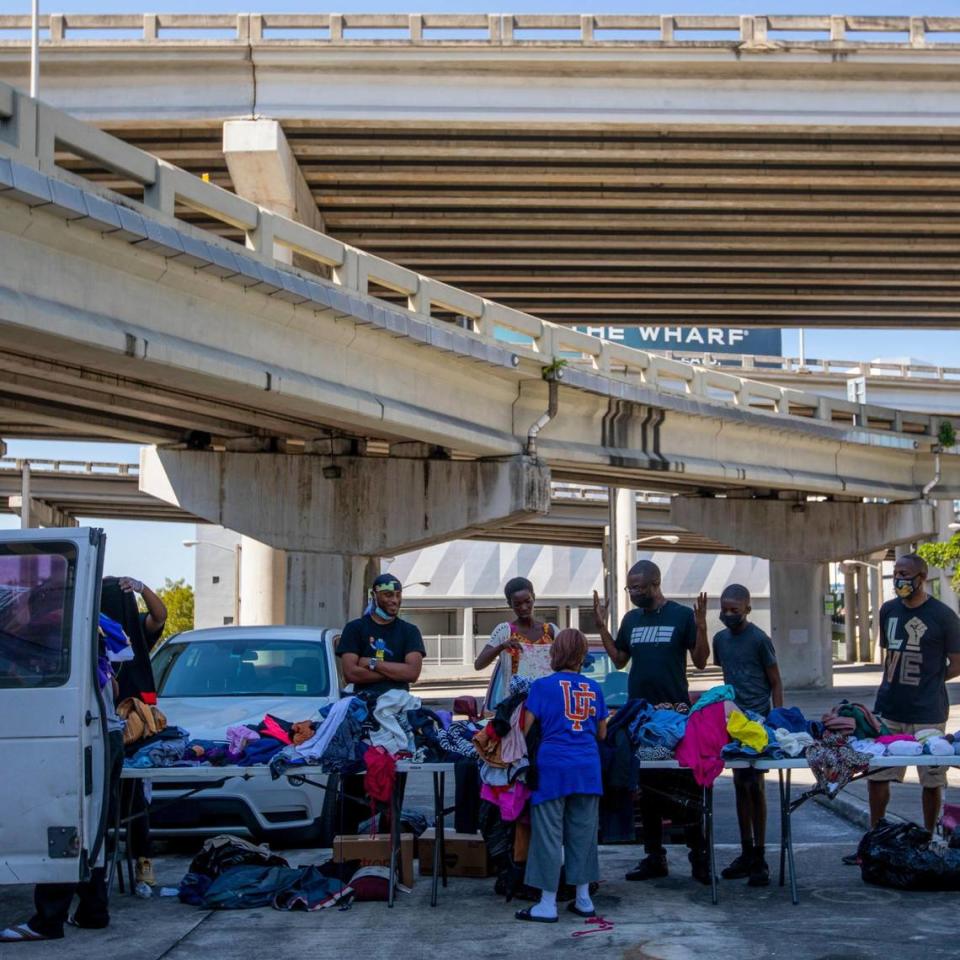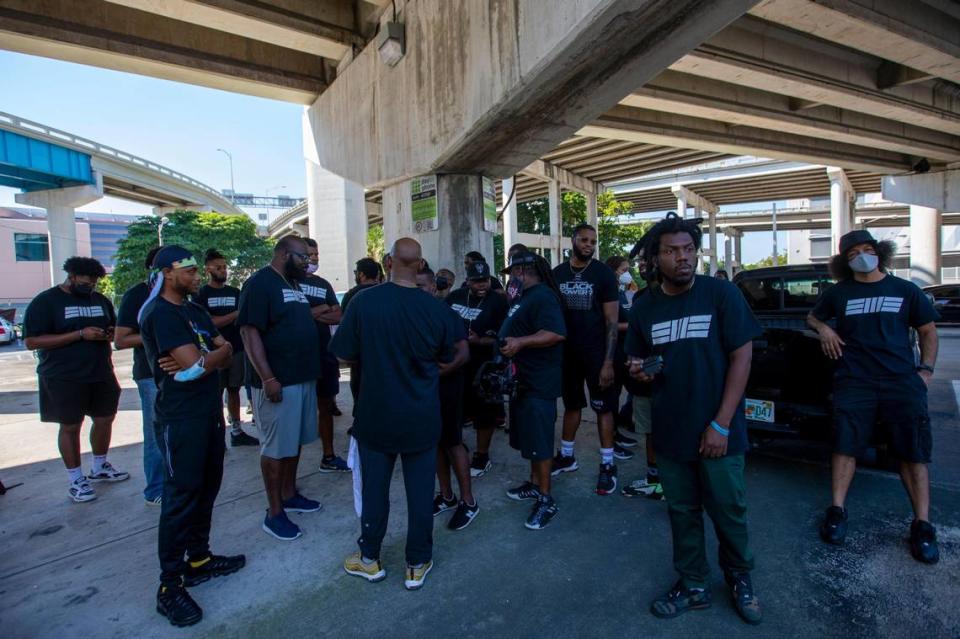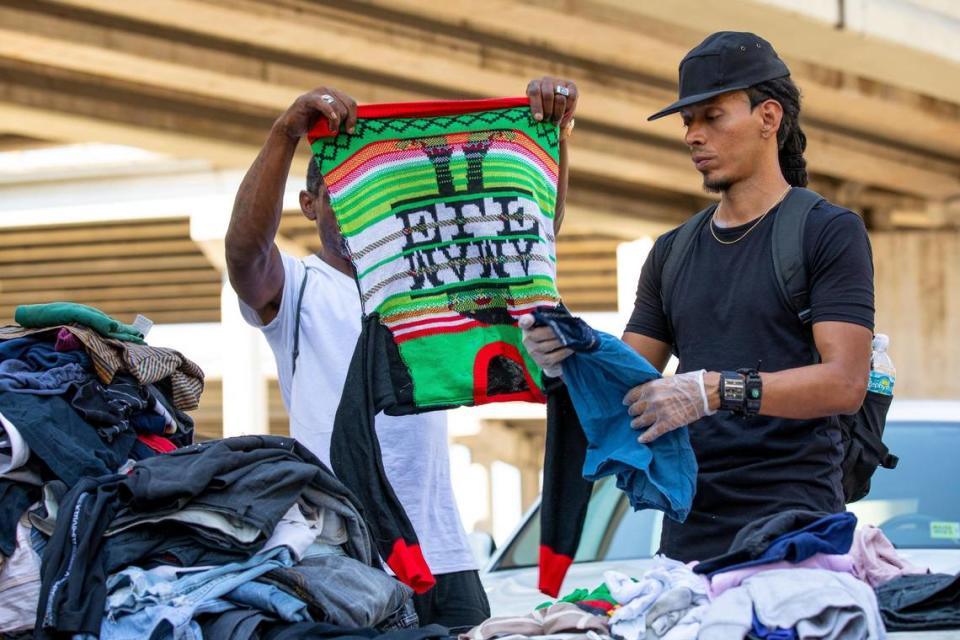‘Sweeping homelessness under the rug.’ Activists say they won’t obey new Miami law
Far below the twisting, turning concrete that marks the place where I-95 crosses over the Miami River and connects downtown with the rest of the eastern seaboard, more than two dozen of Miami’s neediest residents await the arrival of a white van filled with the essentials necessary to survive life on the street in the Magic City.
A group of volunteers stand among the crowd, coaxing them to form a line while fielding questions about shoe and pants sizes. When the van arrives, it’s not only packed with clothes but also sandwiches, water and pasta — making this unsanctioned homeless outreach effort an illegal event.
These sorts of large feedings, which the city code defines as events “likely to attract 25 or more people, including distributors and servers for the delivery or service of food in a public space,” have been outlawed without a permit since July 2020. A ban on homeless encampments could pass and be enforced by the end of November.
Despite the mounting pressure on homeless advocacy groups, some organizations say they won’t comply with Miami’s latest directives, an act of civil disobedience meant to fight what some see as the renewed movement at City Hall to criminalize homelessness.

“If they really want to help unsheltered people, they would end the housing crisis,” said activist Valencia Gunder, whose organization The Smile Trust has helped feed people on the street for the last seven years.
Gunder, who refuses to apply for a city permit, says someone called the police on her for a feeding in August, something she says had never happened before. She and her staff had set up shop in their normal spot at the parking lot on the corner of Southwest Second Avenue and Second Street but were soon greeted by police who forced her to move the operation, according to Gunder. Undeterred, she was right back in the same lot on Sunday.
“This is what we do,” Gunder said. “We shouldn’t be getting fined or criminalized or harassed because we’re helping. The county and the city should be proud of us.”
Gunder isn’t the only provider who claims to have been confronted by police while trying to feed the needy.
Gabby Cordell, who came out to help reconnect homeless people with their families, says she was hit with a $250 fine for a feeding through her organization Choose Love Foundation in early October. Similar to Gunder, Cordell said she had never been bothered by the police in her 15 years of serving. She, too, has zero plans of stopping.
The Miami commission is “waging war on poor people not poverty,” Cordell said. “As a society, we should be helping the poor…. To cut off their food supply is cruel and inhumane.”
It’s unclear how many fines have been issued for feedings. Miami police did not respond to a request for information in time for publication.
‘Sweeping homelessness under the rug’
Street feedings have been controversial for years.
When Florida’s COVID-19 numbers began to rise in June 2020, the Miami Commission passed a measure that restricted feedings to designated areas and only with a permit. In the 16 months since, Miami has received approximately 95 permit applications, all of which have been approved, according to a city spokesperson.
Commissioner Manolo Reyes, the ordinance’s sponsor, penned an op-ed in the Miami Herald in which he argued the “harmful side effects” of feedings, such as “garbage left on the streets, little attention paid to social distancing measures and volunteers exposed to the potential spread of COVID-19,” required regulation.
“We are organizing street feeding and making it more efficient,” Reyes later told the Miami Herald. “We are creating a program that really, if you want to help the homeless, you should be in favor of it, because we are going to have them as a group under a roof and we are going to supply them all of the support that they need.”
In recent weeks, Mayor Francis Suarez has touted that Miami’s homeless population has never been lower. Ron Book, the chairman of the tax-funded Miami-Dade County Homeless Trust, quoted the same data and said feedings incentivize living on the street.
“If we make it easier for folks to sustain themselves outdoors, we have far less of a chance to get them to come inside,” Book added.
But as Sunday’s feeding began to wind down, Philip Agnew, a lead organizer with Black Men Build’s Miami chapter, addressed a group of roughly 20 volunteers, insisting that City Hall’s recent focus on Miami’s homeless community signaled something bigger.

“The city is trying to roll out the red carpet for Silicon Valley and New Yorkers while sweeping homelessness under the rug,” Agnew, a past political adviser to U.S. Sen. Bernie Sanders, told the small crowd.
Members of BMB, a grassroots organization that seeks to create a better future for Black and brown communities, had volunteered with The Smile Trust before, but doubled down on their efforts after hearing about Gunder’s confrontation with police.
Agnew pointed towards Wharf Miami, located just a block away from the parking lot, then to the on- and off-ramps winding above his head. He said both represented the image that Miami wants to project — classy, traveler-friendly, etc. — yet the reality on the ground was much different.

“It’s no coincidence that this [feeding] is all under a highway so people wouldn’t have to see.”
‘These people are our brothers and sisters’
Although Gunder and Cordell will continue advocating for the unsheltered, their service could become a lot more complicated in the coming weeks.
A Miami commission vote scheduled for Oct. 28 could potentially outlaw homeless encampments throughout the city. Originally scheduled for Oct. 14, the final vote was postponed to give commissioners time to talk with advocates.
“We’re going to wait to see what solutions might exist that work for everyone involved,” Commissioner Jeffrey Watson told The Miami Herald on Thursday. “We’re still trying to talk through the issue.”
The measure would ban any temporary living structure, heating devices such as grills and camping stoves as well as the “unauthorized accumulation of personal property” at a maximum of three cubic feet. Police would initially give violators written warnings and instruct them to go to a shelter. Those who refused could be arrested.
Miami Commissioner Joe Carollo says he proposed the new law in response to complaints from residents and business owners frustrated with the constant presence of homeless people.
Book, the Homeless Trust chairman, said he understood why commissioners felt obligated to do something about the encampments but felt the city already had laws in place to clean up the streets.
“If you’re criminalizing homelessness, we’re not supportive,” Book said. “We do support trying to find ways to better balance the interests of all parties in our community. And all parties means homeless folks who are living unsheltered and those people who live and work where encampments exist.”
On the topic of feeding these encampments outdoors, however, Book was less enthused, repeating similar sanitary concerns.
“The right way to feed folks is indoors where they can wash up, where they can get a comfort level of sanitary conditions,” Book said.
Taking a brief break from assisting other Smile Trust volunteers, Darryl Brown described feedings like Sunday’s as “needed” because some shelters, in his view, are unsafe.
“Shelters are probably some of the worse places you can be,” said Brown, who added he has lived on the street for 30 years. “It’s congested. You don’t know who you’re sleeping next to.”
Miami’s potential ban on homeless encampments didn’t surprise Brown.
“The big people that are investing a lot of money in the area, the big high rises and buildings that they’re putting up, they don’t want to see” homeless people, he said, adding that “racism plays a major part.”
It’s for people like Brown that Cordell attended the Oct. 14 commission meeting. Already expecting a heftier fine to come during her next feeding on Tuesday, Cordell viewed the prospective encampment ban and the outlawed mass feedings as a “multi-pronged attack” on homeless people.
“These people are our brothers and sisters just as much as you and I are,” Cordell said.


